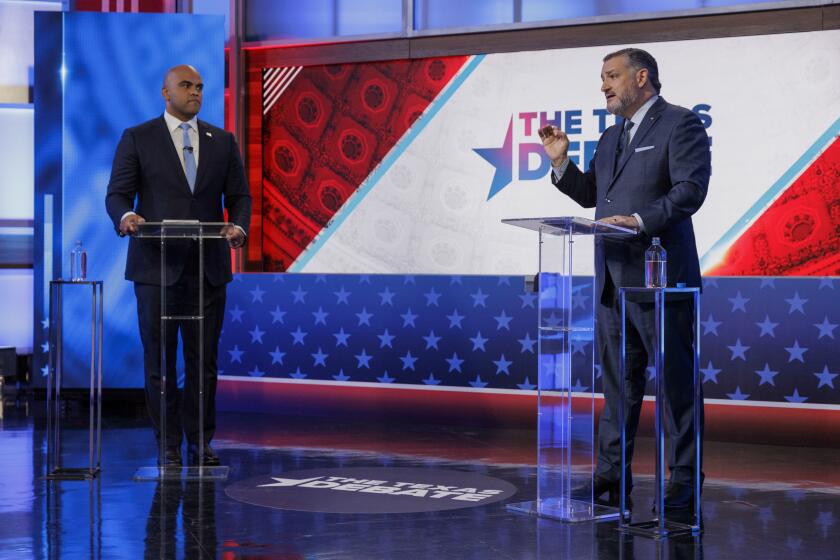NEWS ANALYSIS : Undermining Peace in the Balkans : Yugoslavia: Serb guerrillas, army renegades seem bent on thwarting U.N. mission.
A cease-fire has stifled the flames of war in Croatia for more than a week, but Serbian militants and federal army renegades appear bent on sabotaging a United Nations peacekeeping mission sought by Yugoslavia’s weary warriors.
The nationalist presidents of Serbia and Croatia are clinging desperately to the latest truce in hopes of stopping a war that is threatening to oust them from power.
But opposition to any peace, short of victory, is bursting out among army hard-liners and guerrilla leaders who feel betrayed by Serbian President Slobodan Milosevic’s self-serving turn to foreign mediators for help. Both forces undermining prospects for a U.N. deployment have served as Milosevic’s foot soldiers in the six-month-old war, and they have come to expect continued Serbian backing.
When Milosevic, an authoritarian Communist, needed a loyal lieutenant to instigate an uprising among ethnic Serbs in Croatia, he turned to the Krajina region’s Milan Babic and got the revolt he needed to position himself as a savior of the Serbs.
Croatian President Franjo Tudjman pushed his people into war by trying to politically subjugate the rebellious region. He dispatched police and national guardsmen to wrest control of the organs of power in Krajina, fueling Serbian fears that, as a minority, they would be persecuted after Croatia declared its independence last June.
In answer to Serbian cries of an impending genocide--akin to the ethnic slaughter unleashed by Croatia’s World War II-era Ustasha regime--Milosevic and his supporters in the Serbian capital of Belgrade dispatched nationalist guerrillas to “protect” fellow Serbs.
The irregulars peppered Croatia’s ethnically mixed communities with grenades and gunfire, driving out terrified civilians of all nationalities until only Serbian and Croatian warriors were left to fight. When the job grew too big for Belgrade’s guerrillas, they got backing from the Yugoslav army, which has become Serbian in all but name.
With the help of the army’s daunting arsenal, Serbs have seized control of one-third of Croatian territory.
But the war has already claimed an estimated 10,000 lives, many of them Serbian, and 600,000 people have been forced from their homes by the fighting. The people of Serbia--once keen to settle the score with Croats, who they feel have never paid for their crimes during the last war--have tired of the constant bloodshed and the costs of waging war.
Serbian refugees from Croatia, once welcomed as brothers escaping injustice, are now open targets of resentment in Serbia, where inflation is soaring and economic collapse is imminent.
Faced with a rising tide of opposition to the war, Milosevic has suddenly joined Tudjman’s appeal for foreign intervention to safeguard a shaky peace. The Serbian leader believes the deployment of as many as 10,000 U.N. “blue helmets” will secure the territory Serbia has conquered and prevent the Croats from taking it back.
“The presence of U.N. peacekeeping forces excludes the possibilities that bloodshed continues, while permitting the citizens of Krajina to return to regular life,” Milosevic said in a statement aired repeatedly by Belgrade television this week.
But Serbian militants, like Babic, are refusing to accept what they see as a sellout.
Once a protege of Milosevic, Babic is now defying him. He has refused to disarm his fighters or allow U.N. troops into Krajina, a broad archipelago of Serbian communities scattered along Croatia’s eastern border.
“No one has the right to divide the Serbian people,” Babic’s Serbian Democratic Party declared Friday. In a slap at Milosevic, the party said it will “fight with all means against the bartering of the Serbian Krajina for the sake of a false peace and securing personal power.”
The declaration of an independent Serbian state within the republic of Bosnia-Herzegovina exposes another crack in the facade of Serbian unity in appeals for U.N. help.
When Bosnia’s minority Serbs announced they were forming a new state that includes the predominantly Muslim capital of Sarajevo, they threw down a gauntlet to the republic’s Slavic Muslims and further undermined chances for a stable peace.
Croatian Radio reported Friday that several bombs had exploded in the Muslim city of Mostar and that federal troops had opened fire on a train.
None of the three major nationalities in Bosnia-Herzegovina forms an outright majority. But the 44% Muslim population has joined with the Croats, who make up 18% of the republic, to call on the European Community to recognize Bosnia-Herzegovina as an independent state, against the will of the Serbs who account for 31% of the republic’s 4.2 million people.
(An EC investigating committee will report by Monday on whether Slovenia and Croatia, which have applied for diplomatic recognition by the community, meet the tests--including adherence to democratic principles and respect of minority rights--that the EC laid down. But Britain’s representative to the EC foreign ministers session on Friday in Brussels said there is a “general expectation” that the report will be favorable to Slovenia. No such consensus exists about Croatia, where the official said there is a “serious question about minority rights.”)
In Bosnia-Herzegovina, it was not immediately clear whether the Bosnian Serbs’ call for a new state is in defiance of Milosevic or part of a behind-the-scenes scheme to seize more territory for Serbia.
Radovan Karadzic, Bosnia’s Serbian leader, is a close friend of Milosevic and his former psychiatrist. Karadzic has argued that two-thirds of Bosnia-Herzegovina belongs to the Serbs.
Bosnia-Herzegovina’s Muslim leader, republic President Alija Izetbegovic, vowed after Thursday’s Serbian declaration of secession that the Muslims would never permit the division of the republic, where Muslims and Serbs are so thoroughly mixed that in most towns it is difficult to find an ethnically intact block.
The most disturbing sign of resistance to the peacekeeping force has been the army’s renegade actions.
Five European Community monitors were killed Tuesday when a Yugoslav MIG-21 rocketed their helicopter in mid-flight. (EC foreign ministers, meeting in Brussels on Friday, deplored the deaths and the craft’s downing but said EC cease-fire personnel are still monitoring the present cease-fire on a day-to-day basis.)
Rogue attacks on the coastal resort of Dubrovnik were responsible for scuttling earlier cease-fires.
The helicopter attack prompted the resignation of Yugoslav Defense Minister Veljko Kadijevic, a relative moderate. The Serbian-controlled federal presidency named Gen. Blagoje Adzic, a reputed Communist hard-liner to replace him, raising greater concern that the army is marching to extremist orders.
Milosevic is believed to have engineered this week’s criminal indictment of his chief rival, Vuk Draskovic, leader of the anti-Communist Serbian Renewal Movement. Draskovic led a protest against Milosevic in Belgrade last March that turned into a deadly riot when club-wielding storm troopers moved in.
Times staff writer Joel Havemann in Brussels contributed to this report.
More to Read
Sign up for Essential California
The most important California stories and recommendations in your inbox every morning.
You may occasionally receive promotional content from the Los Angeles Times.











